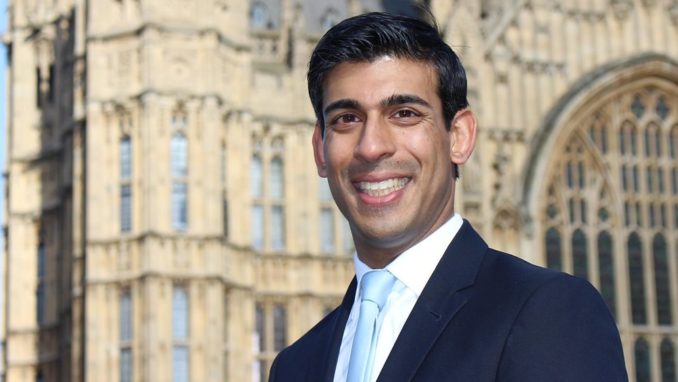
Those of us struggling to get a grip on Chancellor Sunak’s latest relief-measures should note the terminology. He seeks to revive the Covid-stricken economy with a series of tax “giveaways”. When anyone in government talks about giving something away, it’s instructive to ask yourself how they got it in the first place.
Invariably you’ll find that a “free giveaway” is more likely to be a “smaller takeaway” – or even more likely that the chancellor never actually “had” what he is about to “give away”. Just think: if the hundreds of billions now being lavished on “schemes” are conjured into existence by depressing a computer key at the central bank, what exactly is it that’s being “given”?
Money tree addiction
The story of the Sorcerer’s Apprentice comes aptly to mind. The apprentice is tasked with fetching water with a bucket. When his master is away he enchants a broom to do the hard work for him, using a magic spell for which he has no training. But then, horror of horrors, he realizes that he can’t stop the broom because he doesn’t know the magic word needed for that. In desperation he chops the broom in two, but each of the pieces becomes a whole broom that, in turn, takes up a bucket and continues fetching water, but at twice the speed! The resulting deluge floods the entire room.
By the time the master returns and ends the spell, huge damage has been done. He declares: “Only a master is qualified to invoke powerful spirits”. Indeed!
(i) VAT
Take the Chancellor’s decision to help the hospitality sector by reducing the rate of VAT from 20 to 5 per cent for six months. Tax reductions, even when temporary, are welcome of course – but who will benefit the most? Costs to the public of some items will fall, but the reduced rate will also provide businesses with scope for making up some of the revenue lost during the lockdown by selectively raising their own prices to gain at least a slice of the notional VAT reduction.
(ii) Stamp duty
In exactly the same way, ask yourself who will benefit from the removal of stamp duty for property transactions below £500,000. Will house prices fall as a result? Up to a point, but hardly by the full amount of stamp duty saved. The notional price reduction will in many cases be at least partly offset by sellers seizing the opportunity to raise their asking prices – depending, as always, on what the market in that particular region will allow.
(iii) Reviving the High Street?
All this raises the obvious question: if these giveaways are such a brilliant idea, and have such a wonderful way of releasing market forces from the shackles of distorting taxes, who were the morons that imposed them in the first place? You guessed it: the same people!
If the Chancellor were capable of joining the dots in his endeavours to revive suffering High Streets he would require the uplifts in land values that invariably follow grants of planning consent to be shared between the land-owners and local councils – instead of enriching just the owners who, after all, haven’t lifted a finger. Just think what a vast reduction in business rates and council tax such a measure would facilitate!
(iv)….. and Jobs?
Mr Sunak’s chief post-furlough giveaway is his “Jobs-Retention Bonus”. Unfortunately for him companies are unlikely to take back staff they no longer require just for the sake of a relatively trifling bribe of £1,000 per head. This is not reform. It’s fiddling. It’s a variation of “minimum wage” philosophy, devoid of economic principle, rooted in quasi-humanitarian mythology.
Speaking of which, textile and fashion goods firms in Leicester are the latest to be dragged through the mire for allegedly paying sweatshop wages to their largely immigrant staff. Exploitation? Perhaps, but that response is more knee-jerk than thoughtful. So let’s think.
It’s a truism that government “help” always carries an economic price. The minimum wage favours the low–paid over the unemployed. How many in government recognise that there is a trade-off? Raising the minimum wage is certainly good news for those who are paid it, but bad news for those struggling to find work. There’s also another, less obvious, trade-off: the minimum wage is forced to compete with the mounting catalogue of state benefits. This “poverty trap” is another instance of unadulterated state-interference, and its legacy of expediency trumping principle.
“Taxing” wages: an exercise in futility
The real answer to the jobs problem is staring the authorities in the face. I’ll say it again: taxes diminish the base on which they are levied. A “window tax” means fewer windows. (No wonder it was dubbed “daylight robbery”!) If Mr Sunak really wants employment to rise, he should stop taxing it.
I refer here to the biggest linguistic misnomer of them all: “Pay-As-You-Earn” (PAYE). The terminology suggests that it’s little more than a convenient short cut: your employer calculates your tax liability, deducts it from your pay, and every month passes it over to the Revenue on your behalf. That’s certainly how it is portrayed. It’s what the great Frederic Bastiat would have assigned to the world of the “seen”.
But what no employee has ever seen, still less spent, is the phantom known as “gross pay”. Let’s assume you have a job that gives you an agreed amount of pay. If the state suddenly imposes an employment levy on your firm, that tax is its liability, not yours. Yet that’s exactly what happens today, behind all the camouflage. You, the employee, still receive your agreed pay, but your boss now suffers a penalty for every worker that his firm employs. There’s no “gross” pay or “net” pay – just pay. That’s how it used to be in the days when few employees were subject to income tax – until 1944, when PAYE was introduced as part of the state’s effort to pay for the war.
The notional deductions, reliefs, benefits etc that over the years have crept in, render the whole system grotesquely complex, but at root PAYE is still a tax on employment that the employer is legally liable to pay to HMRC every month, and the fact that it is calculated by reference to something called gross pay doesn’t alter that basic fact. If, for any reason, your employer failed to hand over “your” tax one month, HMRC would not come after you. That’s the point – it never was your tax and it was never your liability. It was always a levy on your employer for the sin of employing you!
Real, live case studies
Some years ago I met the perceptive owner of a clothing factory who, recognising the psychological drag on productivity caused by payroll taxes, bravely decided to pay his employees their gross pay without deduction. He was still obliged to make monthly payments to the Revenue authorities, of course, and had to arrive at the tax due by extrapolating upwards from “net” to “gross” pay for each employee.
Naturally, the amount of tax for which he was now liable was greater than previously, but this never worried him because his instincts didn’t let him down: the factory was transformed into a hive of frenetic activity, the improved productivity giving him an overhead recovery rate (and bigger trade discounts on his purchases) that more than compensated for the additional tax.
The news spread and other entrepreneurs in the North and Midlands followed his example, with similar results. My detailed reports on two of these success stories were duly published in “Management Today”. To ease the chore of calculating the tax, I visited the late Nicholas Ridley at the Treasury and persuaded him, on behalf of our enterprising directors, to publish “grossing-up” tax tables to simplify the calculations.
So the message to the Chancellor is: simplify it, standardise it, but please drop the pretence that the employees are bearing the tax. It’s a tax on employment, for which the employer is liable. By all means tax the employees’ other income – but you can’t tax their wages because their wages are…well, their wages.
What an example for the apprentice to follow in the wake of this Covid disaster – assuming he aspires to become a master.
© Emile Woolf July 2020 (website)
The Goodnight Vienna Audio file
Audio Player



